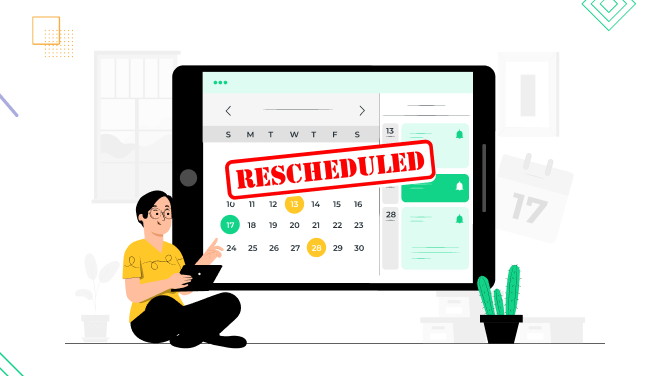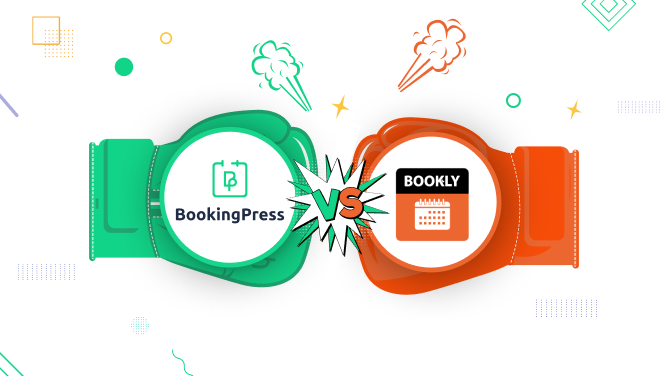How AI is Transforming Online Booking: A Game Changer for Businesses
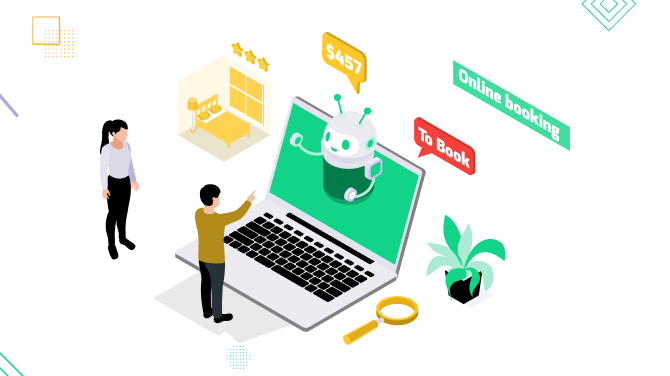
AI multiples automation, personalization, and productivity outcomes for any business. It changes product development and simplifies workflows for creatives. It seems we all can now create and produce at scale with artificial intelligence. But when trying to understand the real cases and niches where it can boost your particular business, the steps are not so clear!
That’s why, as a booking software, we’ve set ourselves a goal to learn more on how AI is transforming the game, especially for industries that are dependent on online bookings, including service scheduling, appointments, real estate, travel, events, and similar niches.
The key question is – does AI really help manage and drive bookings? Ready to learn more about our findings?
What is Artificial Intelligence Already Changing for Booking-Based Businesses?

AI is the next leap for traditional scheduling and bookings. Key AI technologies that are now used in booking-based businesses are NLP, machine learning, and predictive analytics.
What does it mean in real life? Let’s understand the key benefits of AI when it comes to bookings.
- AI tools help increase retention rates with more personalized and automated tools.
- You can highly boost profitability and make processes more efficient.
- Better risk management, for example, detecting spam bookings and preventing financial threats (AI is good at spotting suspicious behavior).
- Faster solve customer requests with AI chatbots (AI-powered chatbots handling bookings via web, WhatsApp, etc).
- AI can better and faster suggest optimal booking times.
- Cross-time-zone coordination for scheduling.
- Significantly reduce no-shows with better automation and upselling.
- Use voice assistants (Alexa, Google Assistant) for hands-free booking.
- Better to analyze the content of user behaviors.
- Get more satisfied customers after all.
But it’s not enough without some real-life cases! Let’s jump to the next chapter.
Examples of AI in Online Bookings
How is AI transforming online booking in real time? What are big names – and smaller too – that employ AI for online bookings? Here are a few great examples we’ve found.
Travel platforms (Booking.com)
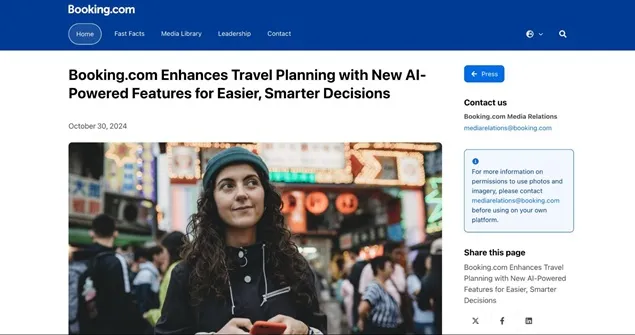
A giant travel platform, Booking.com is expanding its use of generative AI to simplify the travel planning experience for customers. Particularly, they use such AI-powered features as:
- Smart filters, when a traveler can describe their ideal stay in natural language, while AI applies relevant filters to find homes or rooms.
- Travelers can ask detailed questions about accommodations, with AI pulling answers from listings, reviews, and photos.
- AI-generated summaries highlight key insights from reviews and provide travelers with only necessary information.
- The AI Trip Planner helps users build personalized itineraries and even get travel advice in real time.
Appointment scheduling (Scheduler AI)
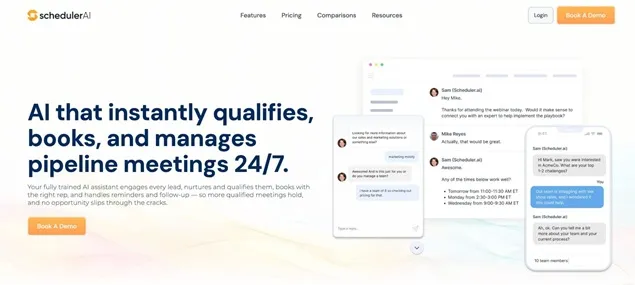
AI-based appointment setter or scheduling assistant? Possible. Tools like Scheduler AI allows you to schedule meetings using natural language processing via email. You basically describe what you need, and the tools do a scheduling task for you – in natural language (to help you find the best meeting times, even across time zones). Also, without manual assessment, people can quickly handle changes by proposing new times and updating participants. It further integrates with your other tools like Slack to schedule meetings from there as well.
Another example with schedulers: tools like ClickUp have some AI features to help you write tasks quicker or suggest actions based on the context of the conversion.
Event bookings (Vendelux)
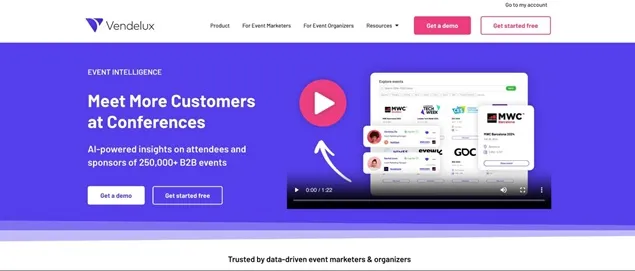
The AI-based Vendelux tool allows event organizers to amplify predictive analytics. Their AI is likely trained on a database of 200K+ B2B events to help marketers target better, measure ROI, and choose the right events. So how does it deal with bookings? It helps predict where a business can have more bookings by identifying high-impact events to attend or sponsor. It can also compare attendee insights to get the best sponsorship deals and plan your event calendar based on data-driven ROI predictions.
The Difference in AI & Automation Tools for Appointment Scheduling
You are probably curious whether your appointment scheduling software has AI tools and whether automation features function as artificial intelligence.
Many automation features are based on rules, which means they normally follow pre-set inner logic. They save time by automating repetitive tasks, but they don’t “think” or adapt on their own. For example, popular booking software like BookingPress has a great many features like that:
- Auto-confirmation emails or SMS reminders.
- Setting availability rules (e.g, “only accept bookings Mon-Fri, 9am-5pm”).
- Buffer time between appointments.
- Recurring appointments.
- iCal/Google Calendar syncing.
- Cancellation/rescheduling links.

These are automation/conditional logic features – you configure them, and the process repeats the same behavior every time.
AI is more ‘aware’ of the context and can learn using natural language processing to ultimately help build a better user experience. Such tools go beyond rules and use data to make decisions, predict behavior, or interpret requests. Let’s try the following examples:
- Predicting best meeting times based on prior behavior or calendar.
- Smart suggestions/personalization based on preferences, past bookings, or client history.
- Chatbot assistants that can book/reschedule appointments conversationally.
- Automatically resolving scheduling conflicts by negotiating across multiple calendars.
- Suggest the best time for group availability.
Overall, AI for bookings is capable of ‘understanding’ and ‘predicting’ decisions. How do they do so? Often using AI models trained on usage patterns or language data. Of course, it’s also more complex to implement and have in each and every booking software since AI features are more advanced, often cloud-based or SaaS-powered.
Let’s Conclude: How AI is Transforming Online Booking?
So, AI is driving bookings in many industries: travel (flights, hotels), healthcare (appointments), wellness and beauty (bookings), and various types of events and experiences.
When we talk bookings, various types and methods of AI can help with:
- AI-driven user profiling (past behavior, preferences, context).
- Personalized recommendations for travelers or appointments (e.g., rooms, times, packages).
- Predicting no-shows or cancellations.
- AI for post-bookings (smart reminders, upselling, and rescheduling)
- Easier follow-ups and feedback collection.
Personalization, automation, analytics, and predictive booking are key things transforming businesses – like right now, in real life.
In the future, AI in online bookings will rely more on hyper-personalization, multimodal booking (voice + visual), and autonomous AI agents managing bookings for people. Explaining all those future AI possibilities is a whole other story. But the way AI is improving, it feels like we’ll be writing that story – about them actually happening – pretty soon.
Related articles:

Get BookingPress Premium
50+ Premium Addons
20+ Payment Gateways
Plan starts at just $79
Get Premium Now




